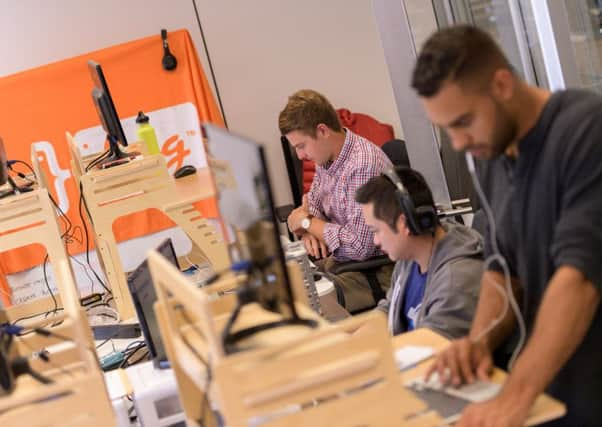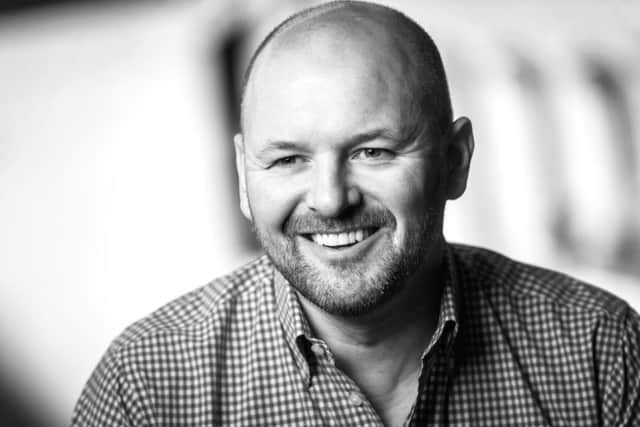Tech accelerator RocketSpace looks to take off in Scotland
This article contains affiliate links. We may earn a small commission on items purchased through this article, but that does not affect our editorial judgement.


San Francisco-based RocketSpace, founded in 2011 by Scots-born entrepreneur Duncan Logan, has so far seen 17 so-called “unicorns” – start-ups valued at more than $1 billion – pass through its doors, and is now looking to tap into Scotland’s tech scene.
Logan, who was born in St Andrews and moved to California ten years ago, told The Scotsman that he was “excited” to be eyeing opportunities for expansion in his homeland.
Advertisement
Hide AdAdvertisement
Hide AdHe said: “Like any entrepreneur working away from their home nation, there’s always this calling to do something back here.”


RocketSpace is due to open a base in London early next year on the back of a tie-up with Royal Bank of Scotland, with a view to helping more fledgling technology firms get off the ground.
“We were super fortunate to find RBS willing to partner up with us and help us get that started,” said Logan during a visit to Edinburgh to take part in the fifth annual Startup Summit, the brainchild of Bruce Walker, founder of fast-growing global entrepreneurship organisation WeAreTheFuture.
He added: “It’s definitely my intention to do more across the UK. Everything focused in London is not a good thing for the UK or Scotland so I’m excited to look at opportunities in Scotland and across other cities in the UK.”


When asked whether RocketSpace has Edinburgh and Glasgow in its sights, Logan said: “I may be looking at a building or two while I’m here, but nothing more concrete than that.”
Logan said that unicorns used to be “incredibly rare creatures” but are becoming more common. Scotland has two homegrown examples in the form of flight search engine Skyscanner and fantasy sports outfit FanDuel, and he said the country has “without a doubt” the potential to see more follow in their footsteps.
“To create a unicorn, you need an enormous force of will,” said Logan. “It’s so much harder creating a unicorn here in Scotland, to be one of the first companies to do it, as opposed to in the Valley, where there’s a lot more talent you can get your hands on.”
The RocketSpace chief executive added: “People think that unicorns are just formed by the founder and that team but you need lawyers and accountants who understand how these things work and recruitment companies who know how to step on the gas. It’s a whole ecosystem that you need around you to form a unicorn and that’s why it’s so hard if nobody’s ever had that experience before. But once these companies get through it once or twice then you get a whole team of people who really know how to help you.”
Advertisement
Hide AdAdvertisement
Hide AdLogan said that the likes of FanDuel and Skyscanner have “now taught a whole generation of management and staff how to handle that kind of rapid growth and build a company of that size”.
He added: “As those people naturally move on into other careers and work with other start-ups you’ll see the next generation come through. The fact that Scotland’s had two already I’m super excited that the in next five, six or seven years we should see the next wave – which will be bigger – coming through.”
Scotland’s universities are a “catalyst” for the country’s technology ecosystem, Logan said, adding that they have an important role to play in encouraging entrepreneurship and the transfer of intellectual property (IP) to the spin-outs they help to create.
“Most universities are getting a lot better at helping students take things that they’ve worked on and turn them into businesses,” he said.
“IP transfer can be incredibly profitable for the universities as well – this idea of holding all the IP to your chest and not letting anyone deal with it is really of a bygone era.”
RocketSpace recently raised $336 million (£270m) from Chinese conglomerate HNA Group to fund its global expansion, and plans to open six offices across China over the next 12 months.
“We forget that China’s tech ecosystem is a lot more competitive than [Silicon] Valley, so it’s beginning to move faster now,” Logan said.
He added: “I travel a lot with work, I do about a week a month in other areas, and every ecosystem is different. The Valley is often criticised for being a bubble – we all produce tools and apps for everyone who’s just within the bubble – so I love coming on these trips and meeting start-ups.”
